Reboot culture has been in full swing for several years now, and this fall saw the adaptation of the 1980’s cartoon She-Ra: Princess of Power. The reboot is titled She-Ra and the Princesses of Power (henceforth referred to as She-Ra), though ‘reboot’ may not quite be the right word. It takes drastic departures from the original show, though a few core concepts remain the same. Both tell the story of a young woman raised as a child soldier in an imperialist military faction known as the Horde on a planet called Etheria. In both renditions, she defects after witnessing the Horde’s evil deeds and finding a magical sword meant only for her that gives her superhuman powers, though the details of how that comes about are very different.
She-Ra has received plenty of criticism, some of it fair and some of it very unfair, but it has broad appeal and a large fanbase. It’s particularly popular in a couple of subgroups. The Exvangelical community has taken to it because they see it as a metaphor for leaving one’s faith after exposure to the outside world. It also has a very strong following in the queer community due to the queer coding of several major characters plus the romantic undertones in the protagonist’s two closest female friendships.
Regardless of their reasons for liking it, most of the fandom agrees that the best parts of the show are the characterization and relationships and how they drive the plot, rather than plot driving character. The most talked about relationship is that between childhood best friends Adora and Catra, the protagonist and primary antagonist, respectively. Catra seems to be the consensus favorite character of the fandom despite technically being a villain, and in fact labelling her the antagonist doesn’t tell the whole story. In many ways she actually functions as a secondary protagonist, leading the storyline over in the Horde camp while in conflict with a much worse villain.
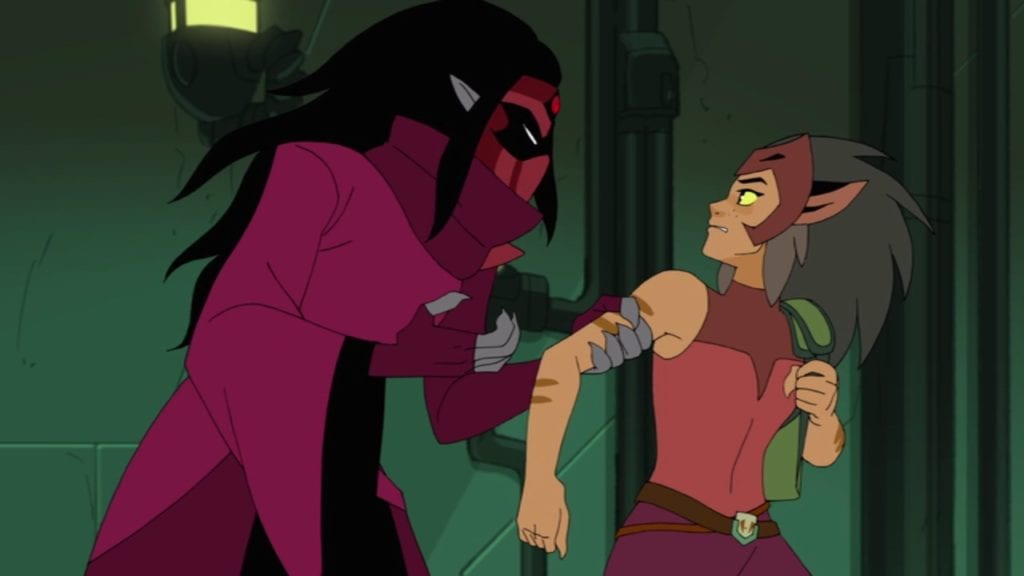
That worse villain is Shadow Weaver, Adora and Catra’s commanding officer/maternal figure. (She is voiced by Lorraine Toussaint, whose stint on Orange is the New Black proved just how well she plays the maternal evil overlord.) Despite technically being second-in-command of the Horde, she functions as the big bad of season one. Lord Hordak does not appear to have much of a relationship with either Adora or Catra at the start of the season and only makes a handful of appearances, while Shadow Weaver’s mark on each of them is very clear. For all the talk about Catradora, it could be argued that their relationships with Shadow Weaver were equally well crafted.
Adora and Catra’s journeys parallel each other in many ways, one of which is overcoming the effects of Shadow Weaver’s manipulation and abuse. Both struggle to move past the messages drilled into their heads since they were children, and both have a major showdown with Shadow Weaver. Adora’s confrontation with her is largely mental, denying her manipulative words after an episode of being stalked and slowly driven mad. The battle between Shadow Weaver and Catra, meanwhile, is more physical. Shadow Weaver hurls insults and binding magic that Catra has to dodge, and in the end Catra physically defeats her, rendering her powerless. (Defeating the big bad at season’s end is usually a task reserved for the protagonist, lending further credence to the ‘Catra as a secondary protagonist’ argument.)
The differences between these confrontations reflect the differences in how Shadow Weaver abuses each of them. Shadow Weaver openly despises Catra and abuses her both emotionally and physically, but her emotional abuse of Adora is much more subtle, to the point that Adora doesn’t realize how messed up their dynamic is until she escapes the Horde and forms some healthier relationships. Despite observing Shadow Weaver’s treatment of Catra throughout their childhood, she doesn’t realize that the Horde (and by extension Shadow Weaver) is evil until she sees the damage the Horde has inflicted on people outside of their faction.
Adora: “They’ve been lying to us, manipulating us, Hordak, Shadow Weaver, all of them!”
Catra: “Duh! Did you just figure that out? Manipulation is Shadow Weaver’s whole thing. She’s been messing with our heads since we were kids.”
Adora’s naivety comes from the fact that she was treated relatively well in the Horde. Yes, she was definitely manipulated and emotionally abused, but she was also groomed for success, constantly praised and validated and given every chance to prove her worth. Catra, meanwhile, struggled to get any positive attention from their superiors, especially Shadow Weaver. It’s not uncommon in abusive households for some children to be favored over others, and in some cases maybe that’s an unintended consequence of bad parenting. But Shadow Weaver seems to do this on purpose to Adora and Catra, intentionally driving a wedge between them because she doesn’t like that her star pupil is best friends with the kid she considers to be the runt of the litter and a troublemaker.
Episode 1×11 features a flashback scene that illustrates the differences in their abuse quite well. After young Adora and Catra got caught sneaking around the Black Garnet chamber (Shadow Weaver’s office, so to speak), Shadow Weaver snagged Catra with binding magic as she attempted to run away. She proceeded to blame the whole thing on Catra and threatened to “dispose of her” if she continued to corrupt Adora and get in the way of her bright future. Then she lightly scolded Adora for not keeping Catra under control, which was also very messed up but not as outwardly harsh.
This incident (and undoubtedly many others throughout their childhood) fostered an uneven dynamic where Adora felt unduly responsible for Catra, while Catra felt like Adora didn’t respect her. It reads very similar to an unhealthy older/younger sibling dynamic, despite them being the same age and clearly not related. Both girls absorbed Shadow Weaver’s messages and reinforced them with their own behavior. Adora got more tightly wound and committed to the Horde because her self-worth was tied up in goodness and success. Catra fell into the troublemaking slacker role because there was no way she could be the good kid or have any success anyway. Why bother trying?
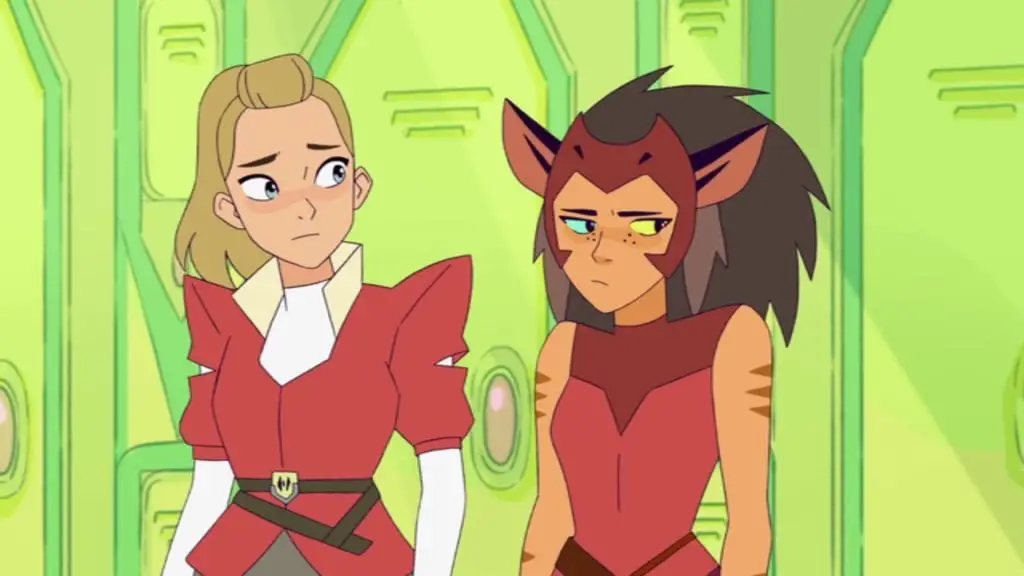
Not only did this dynamic affect their behavior, it affected their perceptions of each other. Adora doesn’t seem particularly bothered by the lack of opportunities for Catra. When Shadow Weaver promotes her to Force Captain but says Catra isn’t ready for active duty, she initially protests but then suggests to Catra that maybe Shadow Weaver made that decision because she’s disrespectful towards her. This is an observation that seems at least somewhat fair on first viewing but is very yikes with more context on rewatch. The implication that Catra deserves to be treated worse by Shadow Weaver ignores how abusive that relationship has been for years. It sounds an awful lot like victim-blaming.
Meanwhile, though Catra clearly cares very deeply for Adora, she also resents her. She keeps it buried pretty well most of the time, and the depth of this resentment is not fully revealed until 1×11, when she accuses Adora of never standing up for her because she enjoyed being the favorite child. This is debatable, because while any child surely enjoys validation, it also put a lot of pressure on Adora that she didn’t seem to want. Catra later accuses Adora of purposely holding her back from any success because she wanted Catra to feel like she needed her, which is patently untrue and a rather twisted view of the situation. But based on the perception of Adora that Catra has, it makes some sense.
Ultimately, the different types of abuse that Adora and Catra suffered ended up shaping the two of them differently, and it set them on parallel but also very different emotional journeys over the course of the season.
The Golden Girl
We see less of Shadow Weaver and Adora onscreen than we do of her and Catra, since Adora defects from the Horde early on. However, we can infer a lot about their relationship based on Adora’s insecurities and behavior. She repeatedly blames things on herself unfairly and beats herself up for not being perfect. Everything is her fault and everything is her responsibility, and if she can’t fix everything then she’s a failure. Unfortunately, being chosen to be She-Ra only adds to her feeling that the whole world is on her shoulders.
This is a major theme in episode 1×04, where Adora struggles with feeling like a disappointment when she can’t summon She-Ra’s healing powers and restore the kingdom of Plumeria. After some reassurance and unconditional kindness from Bow and Glimmer, she comes up with a different way to save the day, and at episode’s end she says that it’s okay if she’s not the perfect hero everybody wants her to be. However, she continues to struggle with this mindset all season, even after fighting off Shadow Weaver’s assault on her mind in 1×07. In the finale, she is determined to defend Bright Moon all by herself so no one else has to put themselves in danger. Ultimately, she fails even with Bow and Glimmer helping her, and Bright Moon is only saved when the rest of the princesses show up and help defend the kingdom.
Bow: “Adora, not even She-Ra can take out an army of Horde soldiers all on her own.”
Adora: “Then what good is she?”
This is an ideal outcome, honestly. It shows Adora that it’s okay to need help and that saving the world is not on her shoulders alone. It’s interesting, because Adora sees herself as incredibly valuable but is also quick to sacrifice herself, put herself in danger to save others. This may be partly due to her kind and noble nature, but it also screams of low self-worth. Adora doesn’t value her own life because she doesn’t see herself as having any inherent worth outside of her accomplishments. After all, her positive attention from Shadow Weaver was dependent on how good she was and how much potential she had. It’s no wonder she grew up to be terrified of failure, her self-worth is wrapped up in success and not disappointing people.
Adora wasn’t always like this. Her goofball side shows up lots of times in young adulthood, and we see that as a kid she wasn’t afraid to get in a bit of trouble. Not only did she tease Octavia to goad a violent reaction for her and Catra’s amusement, the excursion into the Black Garnet chamber was arguably her idea. That unfortunate encounter clearly stuck with Adora despite her not being the one who got in trouble. Her feelings of responsibility for Catra aside, she also appears to feel guilt for the incident. She remembers what’s about to happen and tells Catra she doesn’t have to follow their childhood selves inside and relive the awful memory. That’s not to say it was any picnic for Adora either, though.
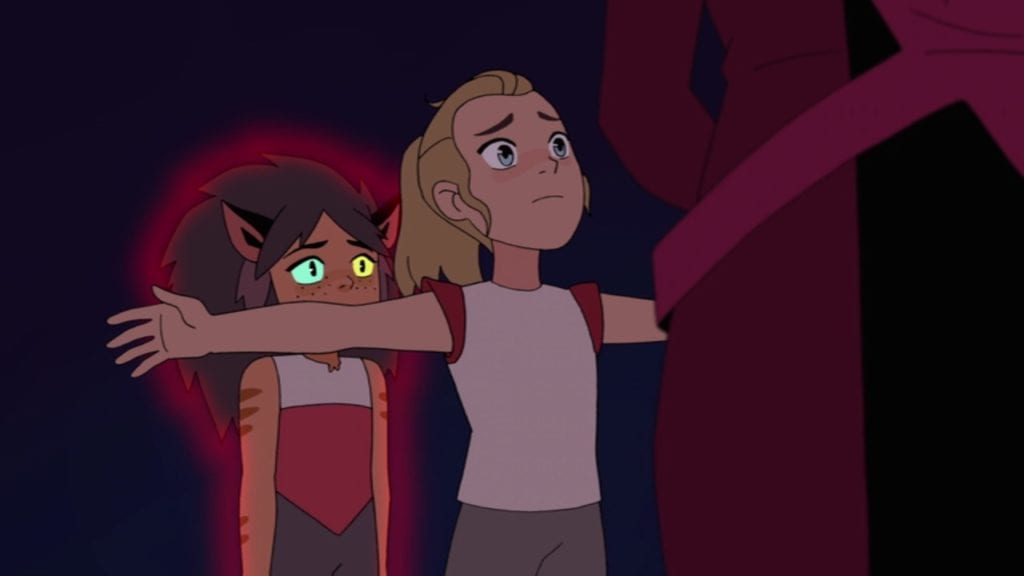
While their relationship looks on the surface to be fairly positive in 1×01, over the course of the season it becomes more and more apparent that Adora is terrified of Shadow Weaver. Why wouldn’t she be, having witnessed what happens to people who get on her bad side? Catra may have seen Adora’s attempts to protect her from Shadow Weaver as underwhelming and perfunctory, but young Adora jumping in and pleading with Shadow Weaver to stop her threatening diatribe was an act of incredible bravery. Even outside of that, Adora did attempt to protect Catra but Catra misinterpreted her actions. Understandably, it looked to her like Adora was complicit in her abuse because she rarely stood up for her and seemed eager to keep her position as teacher’s pet.
The thing Catra does not realize is that part of Adora’s drive to be good in Shadow Weaver’s eyes came from a desire to protect her. Shadow Weaver made Catra out to be a bad influence and threatened her because of it. If Adora was really really good and showed that Catra was not having a negative effect on her, then Shadow Weaver would have no reason to follow through. Adora recognized that anything she did wrong would be blamed on Catra, and seeing her best friend being punished was undoubtedly worse for Adora than being punished herself. Being so careful not to upset Shadow Weaver, she couldn’t really come to Catra’s defense without risking making things worse. While her goody two shoes act appeared to Catra like she was seeking out preferential treatment, it was actually an attempt to keep Catra safe.
So, just how well does Adora overcome the effects of her abuse in season one? That’s debatable. Adora resisting Shadow Weaver’s mind games and declaring she has no power over her in 1×07 is inspiring. However, even after she frees herself from her fear of Shadow Weaver, she still struggles with the internalized guilt and perfectionism left over from her time under her wing. This shouldn’t be surprising, though. One does not get over this kind of thing overnight, and if the show portrayed it as a quick fix it would feel dishonest. It could take Adora years to adopt a healthier mindset. However, she’s in a supportive environment now, full of people who validate her for herself, not her accomplishments. So we can probably expect her to keep moving in the right direction, even if it’s slowly.
The Whipping Girl
Episode 1×01 does an excellent job of establishing the strained relationship between Catra and Shadow Weaver without too much exposition. Catra’s uneasy body language and sassy words around Shadow Weaver give way to frustration that she doesn’t like her after she snaps at Catra and then promotes Adora but leaves Catra out. It implies that this is a longstanding problem, though it’s unclear how it started. The writing staff made an interesting choice by initially obscuring whether Catra’s rebellious streak or Shadow Weaver’s negative opinion of her came first. I liked this technique, though; it reminded me of Orange is the New Black’s set up with Suzanne, where the audience is almost encouraged to laugh at her outrageous behavior in early episodes only to be shamed for it later on as the character gets more depth. It’s tempting to make assumptions about Catra early on without the whole story.
Catra is initially portrayed as a rebellious slacker, but it becomes clear quite quickly that she’s not actually lazy. Unmotivated, yes, because she had no path to success. But once she has one, she sets her mind to her goals and works hard to achieve them. There’s a huge change in her effort and engagement level after she gets promoted at the end of 1×03. As Adora says in 1×01, all Catra wants is a chance to prove herself, and once she gets that chance and some validation and trust from Hordak, suddenly she is committed to the Horde. This gives us another clue that Shadow Weaver was the one to start their feud, though by that time we have already seen Shadow Weaver manhandle and threaten Catra several times. Those incidents establish the abusive dynamic and suggest that Shadow Weaver is the source of the problem.
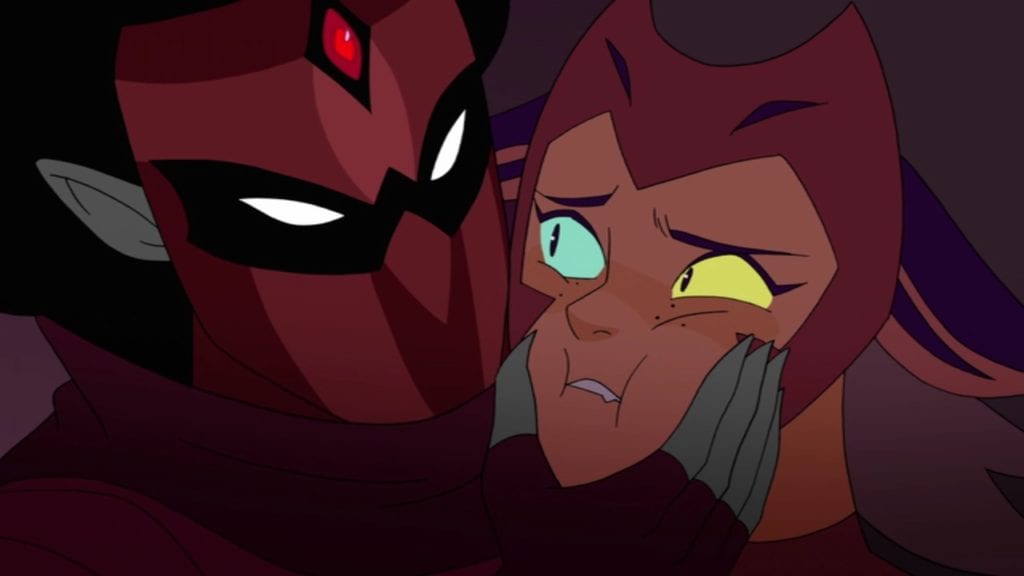
As the season progresses, we witness more of the emotional abuse that made Catra so unmotivated in the first place. Shadow Weaver does not respect her in her new role of Force Captain, belittling her and exerting what authority she still has over her. Even when Catra has success, Shadow Weaver continues to tell her she’s a worthless disappointment who will never amount to anything. By the time 1×11 rolls around, it’s really no surprise to see Shadow Weaver treat young Catra the way she did. Not only did she insult and threaten her, she used her as a scapegoat, blaming her for Adora’s misdeeds and deeming her a bad influence. Ironically, that turned out to be a self-fulfilling prophecy.
One of the more interesting interactions between them occurs in 1×10. After Shadow Weaver is berated for Adora escaping her custody (secretly in part Catra’s doing), Catra sees how devastated she is and attempts to comfort her. It’s not the first time we see Catra showing care and affection for her abuser, either. In 1×04 Shadow Weaver is in the middle of threatening and attacking Catra when her power gets drained, and Catra immediately tries to check if she’s okay before being unceremoniously shoved away. Shadow Weaver reacts similarly in this circumstance, deflecting the concern and insulting Catra before offering a justification for her abusive behavior. Catra doesn’t buy it, to her credit.
Catra: “Don’t worry about that thing with Hordak. I have loads of experience being yelled at. Mostly by you, actually. You get used to it.”
Shadow Weaver: “I will not get used to mediocrity like you, and I certainly don’t need your pity! …I was hard on you, I won’t deny it, and I won’t apologize. I just wanted to prepare you for the world. I wanted you to be strong.”
Catra: “Yeah, well, congratulations. I’m plenty strong now. And I don’t need you.”
As much as Catra despises and fears Shadow Weaver, she’s still the closest thing she has to a mother. Her showing concern for Shadow Weaver doesn’t just solidify who the aggressor is in their relationship and illustrate that Catra is not inherently a bad person, it also addresses an aspect of abusive parent/child relationships that is often ignored. Children of abusive parents generally still have an attachment to said parent, at least until they get to a certain age or breaking point. There’s still the urge to please and connect with this person who should have been giving them that love and validation in the first place.
The rollout of season one doesn’t only illuminate the source of Catra’s dislike for Shadow Weaver and reveal just how much pain she has been living with since she was a small child, it also explains her strong and conflicting feelings for Adora. The more we see of Catra interacting with other Horde members, the clearer it becomes that Adora was the only good thing in her life and that Adora leaving put her in a very precarious position. It flat out endangered her, to be completely frank. Hordak may have decided to promote Catra in Adora’s stead, but she went into that meeting terrified of what he and Shadow Weaver would do to her because of Adora’s refusal to come back with her.
Add to that the revelation that Adora once promised to stick with Catra and look out for her, and it’s very apparent why Adora choosing to leave the Horde felt personal to Catra and hurt her so much. And that doesn’t even cover Catra’s implied romantic feelings for Adora. Adora throwing away everything they have when Catra loves her so much (in one way or another) breaks her already fragile heart. She loves and trusts only one person in the world, and that person chooses to leave their faction with or without her, only inviting her to come along as an afterthought. Catra does some pretty awful things later in season one, but when you look at it from that angle, it’s easy to see the depth of the pain driving those choices.
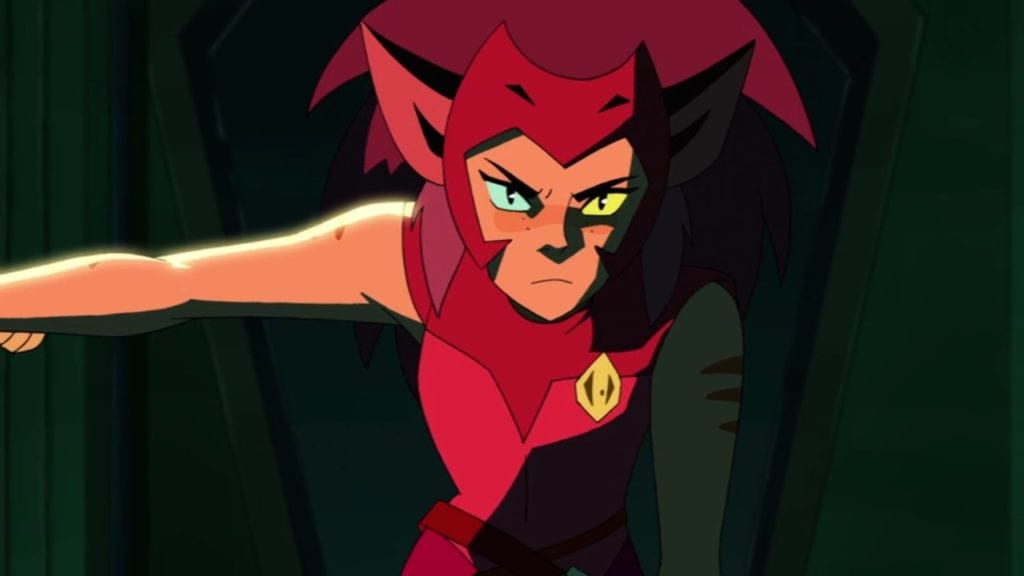
Feelings of betrayal aside, over the season the pieces slowly come together to explain why Catra resents Adora even before she leaves the Horde. It’s not just the audience that learns this as we go along, either. It seems that even Catra doesn’t realize how dissatisfied and powerless she felt her whole life until she engineers Adora’s capture and Shadow Weaver immediately decides to demote her to make room for Adora. After spending the first two thirds of the season trying to get Adora back, this is when Catra realizes it’s better for both of them on an individual level if Adora is gone. As much as she misses Adora and wants their friendship back, she can’t go back to being the scum of the earth, to being perceived as Adora’s unruly pet. Of course that’s not the only reason she helps her escape, but, well, I already covered that.
All in all, Catra has a very different fight than Adora when it comes to overcoming Shadow Weaver’s abuse. One obvious reason is that she doesn’t have a supportive environment in which to reevaluate her perceptions of herself and the world. No, Shadow Weaver is still there and still doing her best to make Catra feel worthless and powerless. The combination of physical and emotional abuse she suffers is particularly potent, in that regard.
(A quick clarification: physical abuse is about more than just hitting people, and there are plenty of incidents I could point to. The instances of Shadow Weaver grabbing [with hands or binding magic], pushing, or throwing Catra are as numerous as they are disturbing. However, while we never actually see Shadow Weaver strike Catra, it’s implied that she may have off screen at some point. Firstly, there’s all the other incidents I mentioned of Shadow Weaver violating Catra’s bodily autonomy. Secondly, Catra’s shrinking body language around her implies she’s afraid of being hit. The real kicker is how Shadow Weaver raises a hand at Catra when she threatens to “put her back in her place” in 1×12. It’s fair to assume that Shadow Weaver has struck Catra before but we never see it because the show is rated Y7 and depictions of violent child abuse are probably a big no no.)
Shadow Weaver’s continued presence doesn’t just mean Catra doesn’t get a break from the abuse, it also means she doesn’t get a break from feeling the need to fight back against it. And fighting off Shadow Weaver’s messages means something very different for her than it does for Adora. Instead of unpacking the abuse and coming to realize these things are untrue and she doesn’t need to prove anything, she becomes obsessed with proving herself. The more Shadow Weaver belittles and insults her, the harder she works to prove her wrong. Even though she doesn’t seem invested in the Horde’s mission at large, her anger and resentment and determination make her a dangerous threat to the rest of Etheria.
One thing she has going for her over Adora is that she has been aware for a long time that Shadow Weaver was abusing her, so she doesn’t need to reevaluate her childhood to recognize that abuse or its effects. She has already been trying to combat Shadow Weaver’s messages for quite some time. While she couldn’t help but internalize those messages to some degree, she always thought they were unfair. Catra never quite stopped believing in herself even when no one else did. She didn’t drink the Kool-Aid, so she doesn’t have to reach into the recesses of her mind and alter the way she thinks of herself in the world as much as Adora does.
That’s not to say Catra’s self-esteem wasn’t destroyed by Shadow Weaver. It was, just in a different way than Adora’s. She’s surprised and somewhat unsure of herself initially after she’s promoted, but as she gains confidence and gets used to her new role, she starts believing she deserves to be a Force Captain and more. So, Catra does overcome the effects of the abuse in the sense that she comes to believe in herself more and more as the season progresses. On the other hand, her tremendous insecurity makes her hungry for power and validation, and she doesn’t move past that at all. Remaining in such a dog eat dog environment doesn’t bode well for her moving forward, either. Let’s just say Catra could use a lot of therapy, and she won’t get that until she leaves the Horde, god willing.
The Cycle of Abuse
Perhaps the most tragic part of this whole mess is the way Catra perpetuates the abuse she suffers instead of attempting to break the cycle. Catra hates Shadow Weaver and is aware of all the damage Shadow Weaver did to her, yet she’s trying to be Shadow Weaver. Okay, she probably isn’t consciously trying to emulate her, but she is certainly recycling some of her tactics and using them to control other vulnerable people. (Adora is emotionally vulnerable when it comes to her and, well, we know how simple and blindly trusting Scorpia and Entrapta can be.) In any case, she is becoming her abuser and it’s painful to watch.
This starts as soon as she is promoted to Force Captain. In the next couple episodes she lords the promotion over her former squadmates, particularly Lonnie. Catra and Lonnie is a minor but especially interesting relationship, as they seem to have been in a power struggle for a long time. Lonnie works harder than Catra and thinks of herself as more capable, so she resents Catra’s favored relationship with their squad’s unofficial leader. Once Adora leaves, she rubs it in Catra’s face that Adora’s presence won’t protect her anymore. She seems to fancy herself the schoolyard bully and new leader of the squad. Consequently, Catra rubs Lonnie’s face in her newfound authority the second she gets the chance. This isn’t necessarily something she learned from Shadow Weaver, but it is an abuse of power. And in the Horde, abuse of power is a fact of daily life.
Shadow Weaver’s tactics show up in Catra’s leadership style more and more as she comes into her own. Not only does she mimic Shadow Weaver’s language and behavior in an attempt to intimidate, Catra manipulates people to get her way and uses intimate touch as false affection and/or to exert dominance. Thank goodness that’s the most physical we see her abuse get. Perhaps this is because she recognizes how wrong manhandling people is, while the manipulation and unwanted touching is a more subtle way Shadow Weaver controls her. She may not even realize she is being abusive, since that’s really the only example she’s seen of how to lead. Her manipulative behavior tends to occur in conjunction with genuine feelings, too, so it probably comes very naturally.
Catra gains Scorpia and Entrapta’s loyalty and trust by empathizing with their feelings of abandonment and exclusion. And she does genuinely empathize. However, she weaponizes that empathy, using their shared experience to make them relate to her and trust her. How much she actually cares for either of them is up for debate. While they both annoy her and can be difficult to wrangle, they also seem to grow on her over time. Some would argue that at least some of Catra’s physical affection toward Entrapta is genuine, though it’s hard to judge that at this point.
I personally am excited to see how their group dynamic evolves in season two, and not just because I stan the Superpal Trio individually and as a group and find their scenes to be absolutely delightful. It will be very interesting to see what happens when Scorpia and/or Entrapta wise up to the way Catra is manipulating and exploiting them. Further, I am very much looking forward to Catra herself having to come to grips with this. It is the most promising opportunity for Catra to realize she is becoming her abuser. Hopefully this revelation will prompt a turnaround, a change of character if not a defection from the Horde.
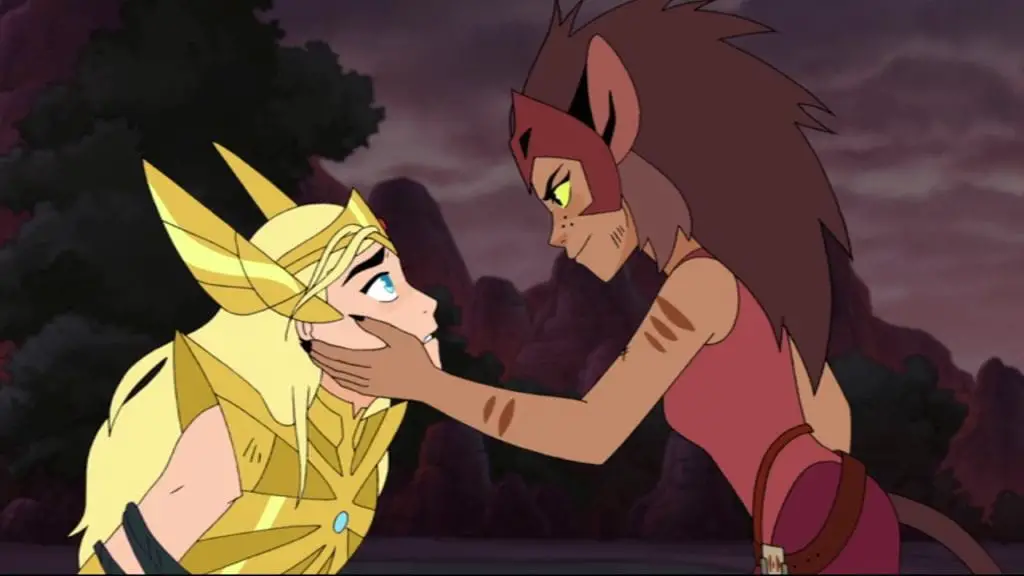
Beyond using Shadow Weaver’s tactics on her allies, Catra uses them to fight Adora. She also weaponizes Adora’s affection for her, messing with her because she knows Adora can’t ignore her. It’s funny to watch at times, like in the prom episode, but feels more and more uncomfortable as the season rolls on. Catra knows Adora better than anyone, and she knows how to distract Adora (and more importantly, She-Ra) so other Horde members can do the dirty work uninterrupted. This is a different but very effective form of manipulation, one Catra uses repeatedly against Adora. She also seems to understand Adora’s fixation on being strong and successful and tries to make her doubt herself and her decision to leave the Horde. Notably, Shadow Weaver does the same thing in 1×07.
Then there’s the use of touch. Not all of Catra’s touching of Adora is false affection or intended to make Adora uncomfortable, some of it reflects her genuine feelings for Adora and their shared history. But there’s one moment in particular in the finale where Adora is bound and helpless and Catra gently caresses her face while she rubs in her victory and how Adora has failed. Gentle head/face touching is very much a Shadow Weaver thing: we see her do it to both Adora and Catra multiple times throughout the season. Usually with Adora it’s a means of control and manipulation, while with Catra it’s a way to exert dominance, touching her to prove she can and there’s nothing Catra can do about it. In this scenario it’s a combination of both, Catra reveling in her victory while also attacking Adora’s self-esteem to make her give up.
Portraying Abuse Effectively
She-Ra’s writing is better in some places than others, I will give the critics that. However, the writing team did a phenomenal job with this storyline and how it impacted every other facet of the story. The accuracy and depth with which they depicted the long term consequences of abuse is astounding. I can’t think of any other show that does this so well, especially one that isn’t even rated PG. In a way, the rating factor may have actually helped them. When focusing on the shock value of violence is not an option, the emotional impact of abuse becomes paramount. That depiction of emotional impact is what makes She-Ra stand out, and it makes both Adora and Catra very sympathetic characters despite their flaws. In fact, it explains their flaws.
Though Adora is a noble and inherently good person, she can come off as a bit of a dimwit with a messiah complex at times. But her backstory makes it clear that her ego is not the issue and her ignorance is largely not her fault. The immense pressure on her to live up to Shadow Weaver’s expectations inflated her sense of self-importance, though in a very unpleasant way. Her skewed worldview is also a direct result of Shadow Weaver’s manipulation. And while it’s fair to criticize Adora for not recognizing just how unfair Catra’s treatment was and how she contributed to her childhood trauma, it’s also very clear that Catra was the one person she cared for and wanted to protect most. Adora is a ball of good intentions gone awry, and it’s tragic that all that pressure meant she barely even got to have a childhood.
As for Catra, well. The sympathetic villain is a common trope in media, but it often falls flat. That’s probably because for a long time screenwriting has been dominated by straight white men who come from money, and it’s hard for privileged people to write a genuinely sympathetic villain. It’s not enough to give a character one tragic life event and act like that can turn an otherwise not evil person into a monster. In general, She-Ra does a very good job of humanizing its villains without falling into moral ambiguity. The Horde are clearly the bad guys, but not everyone who works for them is bad. In fact, a good chunk of them seem to be very nice people, or least ordinary people just trying to live their lives.
While Catra in particular has definitely gone bad by the end of season one, she’s not an inherently bad person. We see her humanity (so to speak) shine through on multiple occasions, and it’s clear she has a big heart, one that is unfortunately easily wounded. She is a genuinely sympathetic villain because She-Ra took the time to establish her lifetime of abuse plus resentment towards and dependency on a single individual. With all that context, it’s easy to see how that person’s betrayal and a need to prove her abuser wrong could lead her down a very dark path. On the other hand, it doesn’t excuse her actions, and I have faith that she will eventually face a reckoning of some kind. Catra has great potential for positive character development if she can swallow her pride and own up to her poor choices.
Let’s hope she does, because the entire fandom is rooting for her.
She-Ra and the Princesses of Power returns to NetFlix on April 26.

